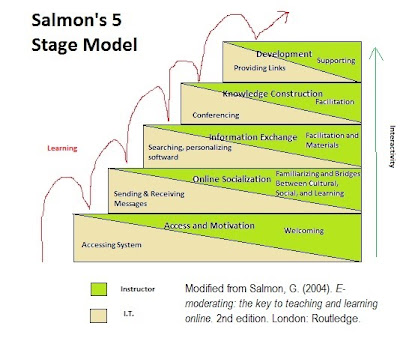Discussion forums are
not being consistently used to effectively contribute to learning. Part of the
problem lay with students while other parts of the problem lay with professors
but it is the forum itself that can adjust and make a difference in the
connectivity of the elements and an improvement in the overall learning
process. Developing strong forums is part of the learning battle and when done
well can impact the quality of learning throughout a university.
According to Rose and Smith (2007) there are a few
best practices with online forums which include giving clear instructions, useful
feedback, improve motivation, set appropriate expectations, organizing the
forums, social presence, determine questions to be asked. Such forums should
not be seen from a static and singular perspective. They are living, breathing,
and moving entities that require an environmental approach from different
angles.
Salmon’s five stage model is a solid reflection tool
that helps to lower things that inhibit student learning. The model provides a
framework for student learning by drawing students into higher levels of
motivation. The different categories can be seen as follows (Salmon, 2004):
Access
and Motivation: Students should be motivated to engage
in the learning process and will need access to the discussions.
Online
Socialization: Online socialization offers an
opportunity engage with fellow classmates.
Information
Exchange: Forums should provide the ability to share and
transfer information.
Knowledge
Construction: Through this information students begin
to develop constructs and knowledge.
Development:
Students use their learned knowledge to provide personal development.
Mokoena (2013) conducted an
interactivity study of online students over a period of three months to assess
the quality of online forums. The researcher found that basic and substantive
posts were impacted by technical problems, unclear expectations and feedback
quality. When there are unclear expectations and a lack of motivation, un-substantive
posts increased while substantive posts declined.
The expectations help students
visualize how much they should engage the forums and at what level. Even though
high performing students may exceed these expectations lower performing
students will need this guidance to at least complete the minimum. Both high
and low performing students like to know whether or not they are meeting these
expectations in order to gauge their performance and effort.
It was also found that technical
support is necessary in forums. When technical problems exist students may not
engage the forums in a clear manner or may end up skipping certain aspects of
their work. Having technical support in a clear and easy to find place will
help students find the technological solutions they need quickly.
Instructors can also foster
motivation and performance by offering accurate feedback and a summation of
the student's work. This depth encourages students to recognize that the
instructor actually cares for the student and is taking note of their
performance. It also allows the student to recap on their conclusions and have
feedback about that synthesis.
The development of strong
interaction online requires multiple approaches which includes access,
information, expectations, and feedback. When professors can engage with their
students well they create a level of expectation and motivation to perform
well. Without this level of
interactivity it is doubtful that students will maximize the use of such forums
and may soon lose motivation. As with all classes there will be students who
perform below, at, and above the expectation. Yet what professors do can
enhance this motivation to create a stronger learning environment.
Mokeoena, S. (2013).
Engagement with and participation in online discussion forums. Turkish Online
Journal of Educational Technology, 12 (2).
Rose, R. & Smith, A. (2007).
Chapter 9 online discussions. In Cavanaugh, C. and R. Blomeyer (Eds.), What works
in k-12 online learning (pp. 143—160). Washington, DC: International
Society for Technology in Education.

No comments:
Post a Comment